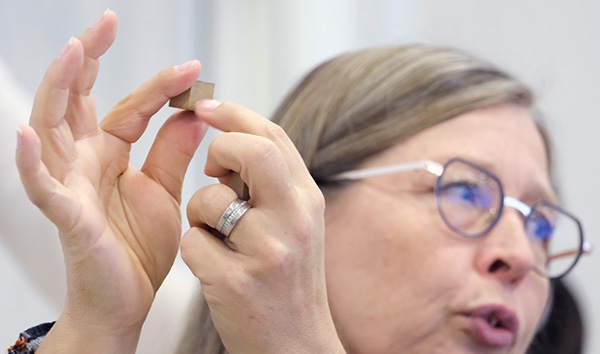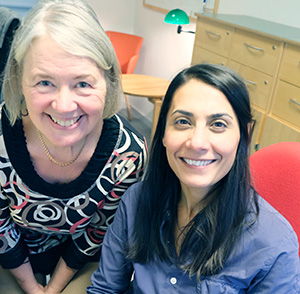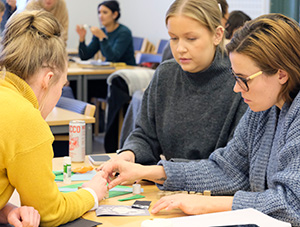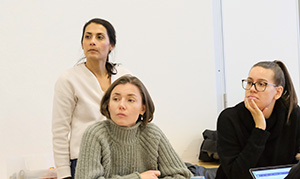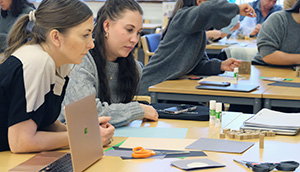Teaching Science and technology for primary teachers
Two teachers from
Learning in Stem
at
The Department of Learning in Engineering Sciences
who teach the subject at KTH
Henni Söderberg
and
Annica Gullberg
share their insights and experiences.
Can you describe how the co-operation between Stockholm University and KTH works when it comes to teaching student teachers in science and technology education?
The cooperation between Stockholm University and KTH is of great importance for our student teachers. Through this collaboration, they gain access to a comprehensive and deep academic foundation that spans both universities. This means that they not only get a solid foundation in science didactics, but also the opportunity to specialise in technology and technology didactics. This gives students a solid foundation to build on and a chance to explore the subjects in depth.
What are the most common challenges and gaps in student teachers' understanding of technology when they start their programme?
It is not uncommon for student teachers to initially have a narrower perception and knowledge of what technology is. Some associate technology only with electronics and digital solutions. However, technology is much more than that; it ranges from the basic functions of technology to its impact on the individual, society, the environment and the drivers of technology development. These knowledge gaps can often be traced back to inadequate technology education in primary schools.
What specific topics and concepts are emphasised in the advanced course in technology education for student teachers?
In the advanced course, we focus on specific topics such as the function and suitability of technological solutions, technological systems, the impact of technology on the individual, society and the environment, and the consequences of technological choices in ethical terms. These topics deepen the basic knowledge from the basic course and give students a deeper understanding of the importance of technology in more dimensions.
How do you think a deeper understanding of technology can benefit student teachers when they later teach their own students?
The deeper understanding of technology by student teachers has several positive effects. Firstly, it enables engaging teaching with practical examples and projects, which increases students' interest in the subject. Secondly, it strengthens student teachers' ability to foster creativity and problem solving in students by encouraging the exploration of technological ideas. Finally, the increased technological knowledge and broader understanding of the impact of technology on society equips student teachers to prepare students for a technology-intensive future. It also enables the integration of technology into other subjects for a holistic and adaptable teaching methodology, promoting the conscious and responsible use of technology.
How can a specialisation in technology education promote creativity and problem-solving skills in student teachers?
By using everyday technological systems as an educational resource, student teachers gain a practical understanding of the relevance of technology in their lives. By systematically exploring and analysing these systems, they can apply theoretical concepts in practice, promoting deeper understanding and connecting theory with reality. Exploration also encourages creative thinking, as when students examine technical systems in jeans to suggest sustainable improvements. This promotes both creativity and problem-solving skills in the field of engineering.
Why is knowledge of the role and impact of technology so important for student teachers, and how can they prepare their students for a technology-intensive future?
For student teachers, understanding the role and impact of technology is crucial, as technology is an integral part of society. Through active exploration of everyday technological systems, they gain concrete knowledge to integrate into their future teaching. By sharing relevant technology examples, they can engage and inspire students. Their understanding of technology also enables them to guide students' awareness of the central role and future importance of technology. They can guide students in the responsible and sustainable use of technology, promoting conscious and ethical use of technology in society.
How do you see the future development of this co-operation between universities and its impact on teacher training in technology education?
Through this collaboration, we as teachers at KTH in the field of science and technology education in primary teacher education have the opportunity to train and mould future technology teachers. These teachers will in turn be equipped to prepare students for a future characterised by technological advances. It is of utmost importance that primary school students receive a solid education in technology. The subject has long been relatively forgotten and neglected, but it needs to be further strengthened - something that can only be achieved through well-trained and committed teachers.
Do you have any advice or insights to share with other teacher educators who want to improve technology education and promote sustainability and ethical aspects in their teaching?
Through real-life examples, students gain a deeper understanding of the impact of technology on individuals, society and the environment. Discussions on ethical dilemmas are important to promote critical thinking about the impact of technology and alternative solutions. An open classroom environment encourages discussion of different perspectives on technology. Within the subject, there are opportunities to create projects that focus on sustainability and ethical issues, providing practical application of knowledge. Teachers should keep up to date with the latest trends and research on sustainability and ethics in the field of technology.
